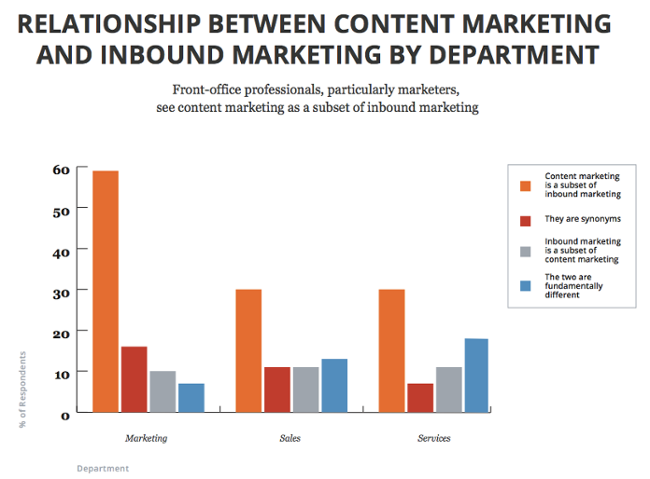
Content Marketing vs Inbound Marketing – What’s the Difference?
How different is inbound marketing from content marketing? Watch out – you’ve just walked into a hotly contested and highly controversial marketing debate.
Let’s define the terms.
To quote HubSpot, the coiners of the term ‘inbound marketing’, on what inbound marketing is: “Instead of the old outbound marketing methods of buying ads, buying email lists, and praying for leads, inbound marketing focuses on creating quality content that pulls people toward your company and product, where they naturally want to be. By aligning the content you publish with your customer’s interests, you naturally attract inbound traffic that you can then convert, close, and delight over time.”
Whereas content marketing, as defined by the Content Marketing Institute, is : “… a marketing technique of creating and distributing relevant and valuable content to attract, acquire, and engage a clearly defined and understood target audience – with the objective of driving profitable customer action.”
We’ve got to admit that these sound very much the same. Content is the linchpin of both strategies and both aim to magnetically draw people in to become consumers. Most people – even marketers – see the similarities and some don’t even care what the difference is. As HubSpot’s former Content Team Senior Manager Jay Acunza succinctly puts it in LinkedIn, “While I personally say ‘content marketing’, without any thought as to why or whether it matters, I will hereby and for the rest of this blog post call it Marketing Wherein You Create Content and Other Things People Volunteer to Consume Instead of Spamming Them with Me-First Messages (or MWYCCAOTPVTCIOSTWMFM).”
And that is the essence of both these marketing strategies – create content your audience is going to love, and they’ll happily and enthusiastically become consumers when you nurture them down the purchasing funnel.
However, there are some key differences between the two strategies.
Mainly, the differences lie in the depth of each concept; there is a lot more to inbound marketing than content.
In fact, HubSpot recently did an exhaustive survey of 3 500 marketers to get their opinion on the difference between the two, and the overwhelming feedback was that content marketing is an important subset of inbound marketing.

How different is inbound marketing from content marketing? Watch out – you’ve just walked into a hotly contested and highly controversial marketing debate.
Let’s define the terms.
To quote HubSpot, the coiners of the term ‘inbound marketing’, on what inbound marketing is: “Instead of the old outbound marketing methods of buying ads, buying email lists, and praying for leads, inbound marketing focuses on creating quality content that pulls people toward your company and product, where they naturally want to be. By aligning the content you publish with your customer’s interests, you naturally attract inbound traffic that you can then convert, close, and delight over time.”
Whereas content marketing, as defined by the Content Marketing Institute, is : “… a marketing technique of creating and distributing relevant and valuable content to attract, acquire, and engage a clearly defined and understood target audience – with the objective of driving profitable customer action.”
We’ve got to admit that these sound very much the same. Content is the linchpin of both strategies and both aim to magnetically draw people in to become consumers. Most people – even marketers – see the similarities and some don’t even care what the difference is. As HubSpot’s former Content Team Senior Manager Jay Acunza succinctly puts it in LinkedIn, “While I personally say ‘content marketing’, without any thought as to why or whether it matters, I will hereby and for the rest of this blog post call it Marketing Wherein You Create Content and Other Things People Volunteer to Consume Instead of Spamming Them with Me-First Messages (or MWYCCAOTPVTCIOSTWMFM).”
And that is the essence of both these marketing strategies – create content your audience is going to love, and they’ll happily and enthusiastically become consumers when you nurture them down the purchasing funnel.
However, there are some key differences between the two strategies.
Mainly, the differences lie in the depth of each concept; there is a lot more to inbound marketing than content.
In fact, HubSpot recently did an exhaustive survey of 3 500 marketers to get their opinion on the difference between the two, and the overwhelming feedback was that content marketing is an important subset of inbound marketing.